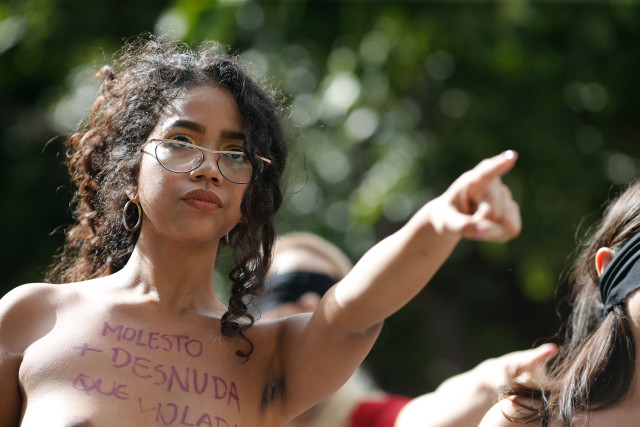By Xili Fernandez
Photo credit: Reuters, Manaure Quintero. The text in the woman’s chest reads ‘I disturb more naked than raped’
Last week, multiple feminist groups in Merida, Maracaibo & Caracas invited people to participate in the globally famous performance of ‘Un violador en tu camino’ (a rapist in your way). Created by the Chilean interdisciplinary women’s collective LasTesis, it first performed in Valparaiso, going viral worldwide through non-traditional media to places like Mexico City, Bogota, Beirut, Istanbul, Madrid, Paris, New York City and now Venezuela. Caracas had two invitations for this performance on separate days. The media focused more on the ideological differences of the feminist collectives who did each invitation, ignoring as usual the main problem at stake: women are subjected to systematic violence in Venezuela.
Chavez and Maduro have ruled with prominent female figures presiding over the Supreme Justice Court, the National Assembly, the General Attorney office and at some point, Venezuela had around 40% female parliamentarians. The constitution text addresses female and male citizens and laws against violence directed at women were passed. On paper, the government has ticked some gender boxes. However, the political program of chavismo is not feminist nor revolutionary, and such female leaders only represent the privileged women of the chavista bureaucracy and bourgeoisie, not Venezuelan female workers and their struggles. The situation that working class women live in has deteriorated to its lowest point in more than half a century.
In fact the conservative traits of Venezuelan society have deepened in the two decades of the chavista regime, which uses a reactionary discourse praising the domestic role of women, super-exploits women labour in social programs and commonly resorts to ultra-Christian rhetoric. It came as no surprise when abundant social media attacks targeted the feminist collectives following both performances of the Las Tesis act in Caracas. Guaido’s supporters dismiss the fight for women’s protection as irrelevant, likening the situation of Venezuelan women to any other violations of rights that are happening currently, playing down the ways in which the crisis specifically affects women and girls. Maduro’s followers blame the opposition and foreign powers for the ongoing crisis, as if the regime had no resources or power to implement what they preach in their pseudo-progressive speeches, keeping women and girls among one of their most vulnerable groups in today’s Venezuela.
The state is a rapist
Like the Chilean government in its repression of the popular movement, the Venezuelan government has used sexual violence as a form of torture against women detained in the 2017 popular rebellion and other protests. But there are also other ways in which the Venezuelan regime is complicit with rape. There is no official data in regards to crimes against women published regularly since 2015. In August 2019, an unusual public declaration by the CICPC’s Director (a national police agency in charge of criminal investigations and forensic services) affirmed the agency registered 1,180 cases of sexual abuse in 2019. Also that month, the General Attorney confirmed 554 feminicides were recorded in the last 2 years at the Public Ministry.
Discussions with victims of sexual violence in Venezuela, reveal that following a sexual aggression victims find plenty of stigmas along the uninformed route they have to navigate in the search for justice (which is rarely achieved). From unsupportive relatives or friends to insensitive, ignorant and at times even aggressive medical and legal staff, the process constantly re-victimises them.
The first step usually moves towards legal action. Authorities and the general public ignore the importance of prioritising medical assistance, especially within the first 72 hours, which are crucial to obtain medication that can prevent infection with HIV and sexually transmitted diseases (STDs) or unwanted pregnancies. Finding these drugs is not easy and in some health centres the drugs might be available, but the qualified health professionals trained in how to administer them have left the country or work at a private unaffordable center. Psychological attention is of outmost importance in these emergencies, yet is rarely provided to the victims.
Victims of sexual violence in Venezuela have reported that in some health centres and hospitals they are asked for proof of the legal action taken before gaining access to medical assistance, a myth that state institutions have created by prioritising legal over medical action following a sexual attack. Other victims of sexual violence say they have been denied medical care as soon as they talked about the aggression with the medical staff, given that a lot of nurses and doctors do not want to be involved in legal procedures and investigations once the victim takes legal action against the perpetrator. With or without legal action against their attackers, women pay the price with their health. Capacity building and training on how to approach sexual violence victims is urgent among Venezuela’s health professionals.
At the police offices, the victim will be received by a male staff probably and in the best scenario, he will not re-victimise her by asking her about her clothes or whether she did something to provoke the perpetrator. In the worst scenario, the officer might go as far as flirting with her or commit a new attack even. During the examination at the forensic services, one or more repetitions of the story will be necessary and the victim might enter a never-ending ping pong around multiple services in all these institutions (medical, legal, social workers) since the route is not clear and the staff turnover in all these establishments leave women attended by personnel who is not properly trained to deal with these cases.
Protection measures might be obtained in paper after an arduous process, but the possibility of real protection depends more on the victim’s economic situation, where she lives or who supports her. Re-victimisation is the main characteristic of the legal and medical route for victims of sexual violence in Venezuela, a process psychologists working with such patients warn against, as telling the story again and again relives the trauma for the victim. What this reveals is once again the violence of the Venezuelan capitalist state against women.
Women and the crisis
While the army and privileged sectors of the bureaucracy and the bourgeoisie can find virtually any product and pay for it with dollars or euros, most Venezuelans face misery and scarcity since well before the first economic sanctions. Contraceptives are scarce and expensive in Venezuela, increasing the risk of contracting HIV and other STDs, for which the necessary medical treatment is also missing. Venezuela has an alarmingly high teenage pregnancy rate and despite the lack of official data, reports from UN High Commissioner for Human Rights, Michelle Bachelet, showed an increase of 65% of teenage pregnancies since 2015. Many girls and teenagers drop school when they get pregnant, forced by their families, partners or the dire economic situation that requires them to work. Incest is common in Venezuela, explaining also the escalation of adolescent pregnancies.
Abortion is still criminalised in the country, leading to the rise of avoidable maternal mortality with a 20% estimated maternal deaths linked to abortions practiced in unsafe conditions. Several civil society organisations demand the decriminalisation of abortion in Venezuela and denounce the lack of information and accompaniment that women face when they choose over their pregnancies, scarring not only women but also entire communities.
Other reasons for the increased maternal mortality have to do with the overall deterioration of health conditions and malnourishment, the collapse of the public health system due to budget cuts by the government, and an absence of qualified staff, as health professionals enlarge the brain drain that the country suffers. Missing medical equipment and supplies, combined with the appalling conditions of hospitals, drive women outside the country too. In the ongoing migration flows that have forced around 5 million Venezuelans outside the country, women and girls face higher risks in the migration routes, preyed upon by human trafficking and sexual exploitation networks who make profit out of their need, sometimes even threatening their relatives back home.
The noise will not stop until the abuse stops. Linda Loaiza, a prominent Venezuelan human rights defender and a sexual violence victim back in 2001, expressed her support to the “el violador eras tú’ (you were the rapist) performances. She says she never expected the state would also torment her, as she had 15 reconstructive surgeries without state financial aid, faced the stigma of the media and the generalised public and the impunity of a judicial system that turned her aggressor into a supposed victim.
Re-victimised and having exhausted all the legal resources in Venezuela, Loaiza resorted to the Inter-American Human Rights System and obtained the first ruling against a state for being responsible for acts of violence against women, recognising that her case was filled with grave institutional failures that persist today. More than a year after the court ruling, Maduro’s government is yet to fulfil the long overdue reparations to Loaiza.
As the debate around the performances continues, often pointing fingers against women and feminist collectives, it’s important demand that private and state media stop using phrases and terms such as ‘passion crime’, ‘out of jealousy’, ‘infidelity’ or any other expression where judgment puts the blame on the victim, focusing on the story and the facts as they are, because violence against women is a universal social problem and crimes against them are not isolated incidents or exclusive of impoverished areas.
Even if small in attendance, the performances in Caracas, Maracaibo, Mérida and Barquisimeto are bringing national attention to the problem of violence against women, specially by the government. After all the efforts by chavismo to control and destroy the women’s movement, there is still hope for true change through autonomous struggle.


La impunidad reinante en Venezuela contra los delitos cometidos por delincuentes comunes, policias, militares y personal del ejecutivo nacional y regional, es parte de lo que viene ocurriendo en el mundo. Esta forma de protección del estado hacia la impunidad, les permite a las cupulas de poder mantener el terror sobre la poblacion en su avance de alguna reacción de sublevación contra el sistema impuesto, bien sea capitalista o “socialista” .
LikeLike